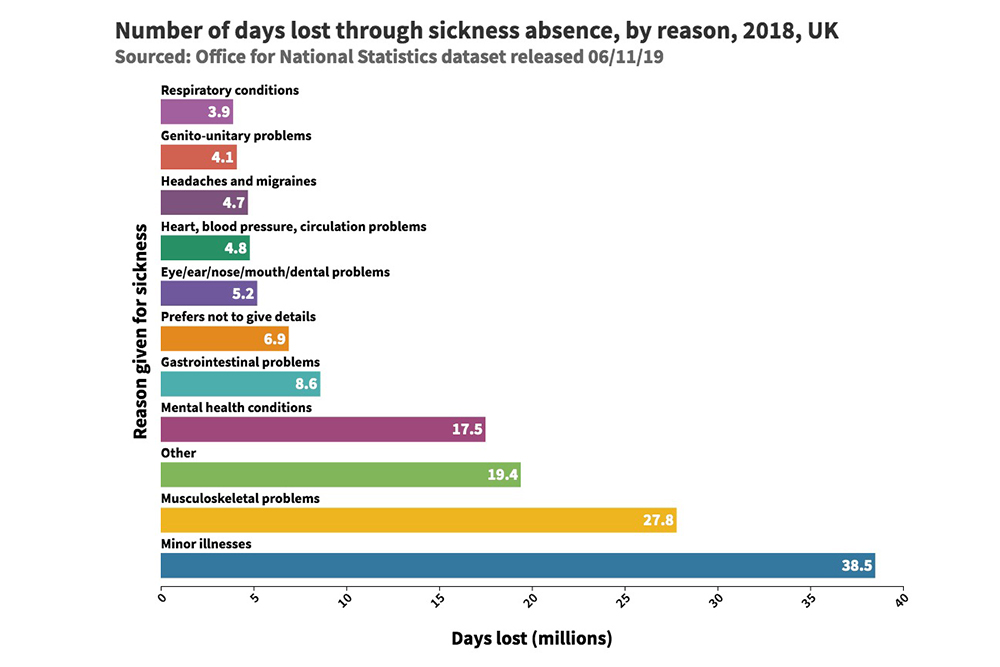The importance of mental health sick days

Data published this autumn by the Office for National Statistics (ONS) revealed that 17.5 million work absences were taken last year due to mental health. This includes stress, depression, anxiety and serious mental health problems. This is more than 2 million more days lost than in 2017.
There is a clear increase – one that can be interpreted in two different ways, or both.
Head of Workplace Wellbeing at Mind, Emma Mamo, says: “It’s concerning that an increasing number of staff are needing to take time off sick due to problems like stress, anxiety and depression. It’s not clear whether these issues are on the rise or, more positively, whether it’s now more acceptable for staff to be open when they need time off work for these kinds of problems.
“As stigma surrounding those of us with mental health problems dissipates, it’s likely that we will continue to see an upward trend in people telling their employers when they need time off sick for mental health reasons.”
It will be interesting to see the figures once this year comes to an end. If we interpret these new ONS’ statistics positively, it is promising more people feel comfortable enough to disclose their mental health problems. There has been credible improvement in the way we recognise and deal with mental health. However, the prevalence of it in the UK is still indisputably high and the stigma has not yet been eradicated.
Many people fear sending an email to their boss saying ‘Hi, I won’t be coming in today. My anxiety is really bad and I need to use the day to recover’ and would rather reel off descriptive symptoms of the flu. There were 38.5 million sick days taken due to minor illnesses last year. Though it is logical this would be the most common, one can only wonder how many times this reason was used as a cover-up for a mental health-related one. Not to mention what lies behind those listed as ‘other’ and ‘prefers not to give details’.
We recognise the common cold as an acceptable reason. It’s hard to do your job properly with a fever, runny nose and headache. It’s clearly visible. But most significantly – we all suffer from it. This is obvious stuff. Surely then, if most of us will experience a mental health problem at some point, our experience of this should translate into our understanding of needing a sick day for it.
It seems responsibility should start with the employer. “Smart, forward-thinking employers recognise the importance of investing in the wellbeing of their staff and those who do take this issue seriously are more likely to report staff who are happier, more loyal, productive and less likely to take time off sick or fall out of work altogether. It also makes financial sense – evaluations of workplace interventions by Deloitte as part of the 2017 Thriving at Work review show a return to the business of between £1.50 and £9 for every £1 invested,” says Mamo.
This will help employees to feel they can be honest about mental health and the response will be understanding (if you feel comfortable enough, Mind encourages talking about it). To keep improving things, we have to discuss the downfalls. But we don’t want to make things worse by labelling them ‘mental health sick days’ too much and separating them entirely, taking us further away from our intention. We have to strike the right balance.
Mamo adds: “It’s unhelpful to specifically label ‘mental health sick days’, especially given that mental health and physical health problems often go hand in hand. If you live with a chronic physical health condition such as a back problem or arthritis – especially if you are regularly in pain and unable to do the things you enjoy – it’s understandable that this could take its toll on your mental health too.”
There are many less visible physical conditions that also fall victim to similar misunderstandings – 27.8 million sick days were taken last year due to musculoskeletal problems. We want equality for the brain and the body within the framework of health and wellbeing.
If you need a sick day, or time off, the advice is to trust yourself- “It’s up to individual employees to decide whether and when a health problem – either physical or mental or a combination of both – prevents them from working and warrants time off sick from work.”
As far as the new government is concerned, Mind is calling on them to make workplace wellbeing a key priority. This includes increasing Statutory Sick Pay (SSP) and improving access to rights and protections for disabled people in work, including many people with mental health problems, under the Equality Act 2010.









